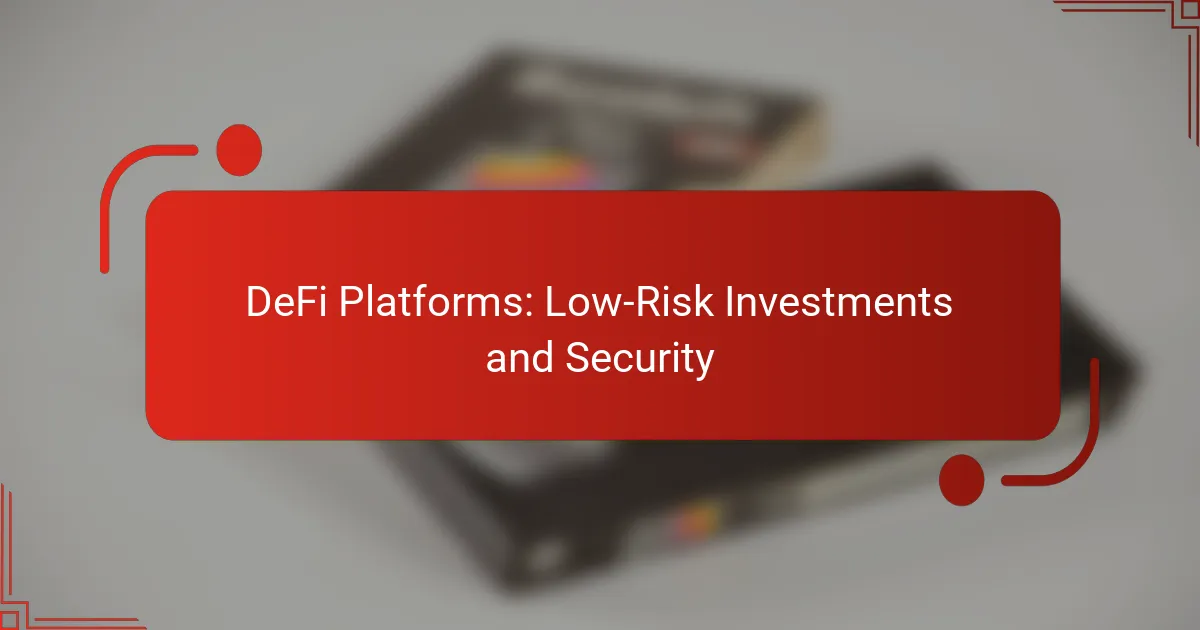Decentralized finance (DeFi) platforms provide opportunities for low-risk investments by offering stable yields and enhanced security features. These platforms are designed to help conservative investors earn interest on their assets while minimizing exposure to market volatility. With a focus on robust security measures such as smart contract audits and insurance protocols, users can navigate the DeFi landscape with greater confidence.
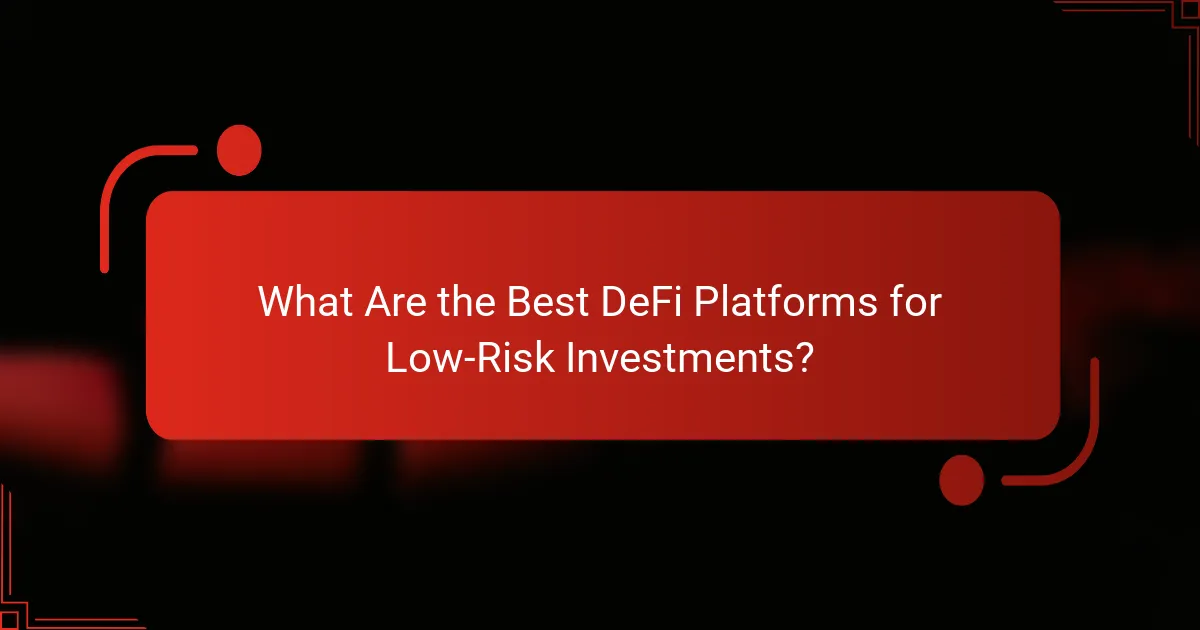
What Are the Best DeFi Platforms for Low-Risk Investments?
The best DeFi platforms for low-risk investments typically offer stable yields and robust security features. These platforms allow users to earn interest on their assets with minimal exposure to volatility, making them suitable for conservative investors.
Compound Finance
Compound Finance is a decentralized lending protocol that allows users to earn interest on their cryptocurrency holdings. By supplying assets to the platform, users can earn variable interest rates, which are determined by supply and demand dynamics. This platform is known for its strong security measures and has undergone multiple audits.
Investors should consider the liquidity of the assets they supply, as some tokens may have lower demand and yield lower returns. Additionally, users can easily withdraw their funds at any time, providing flexibility in managing their investments.
Aave
Aave is another popular DeFi lending platform that offers a range of features, including flash loans and variable interest rates. Users can deposit cryptocurrencies to earn interest or borrow against their holdings. Aave’s unique liquidity pools allow for competitive rates and the option to switch between stable and variable interest rates.
When using Aave, it’s essential to monitor the health factor of your loans to avoid liquidation. The platform’s user-friendly interface and comprehensive documentation make it accessible for both new and experienced investors.
Yearn Finance
Yearn Finance is a yield aggregator that optimizes returns for users by automatically reallocating funds across various DeFi protocols. By depositing assets into Yearn’s vaults, investors can benefit from the highest available yields with minimal effort. The platform is designed to minimize risk while maximizing returns.
Investors should be aware of the fees associated with using Yearn, as they can impact overall returns. Additionally, understanding the underlying strategies of each vault can help investors align their risk tolerance with their investment goals.
Curve Finance
Curve Finance specializes in stablecoin trading and liquidity provision, offering low slippage and low fees for stablecoin swaps. This platform is particularly attractive for users looking to earn yields on stable assets while minimizing volatility. Curve’s liquidity pools are designed for efficient trading between stablecoins.
Users should consider the impermanent loss when providing liquidity, although it is generally lower for stablecoin pairs. Curve also offers governance tokens that can enhance returns through staking or yield farming opportunities.
MakerDAO
MakerDAO is a decentralized lending platform that allows users to generate DAI, a stablecoin pegged to the US dollar, by collateralizing their crypto assets. This mechanism provides a way to leverage assets while maintaining a stable value. MakerDAO is well-established and has a strong track record of security and reliability.
Investors should keep an eye on the collateralization ratio, as falling below the required threshold can lead to liquidation. Understanding the stability fees associated with DAI generation is also crucial for managing costs effectively.
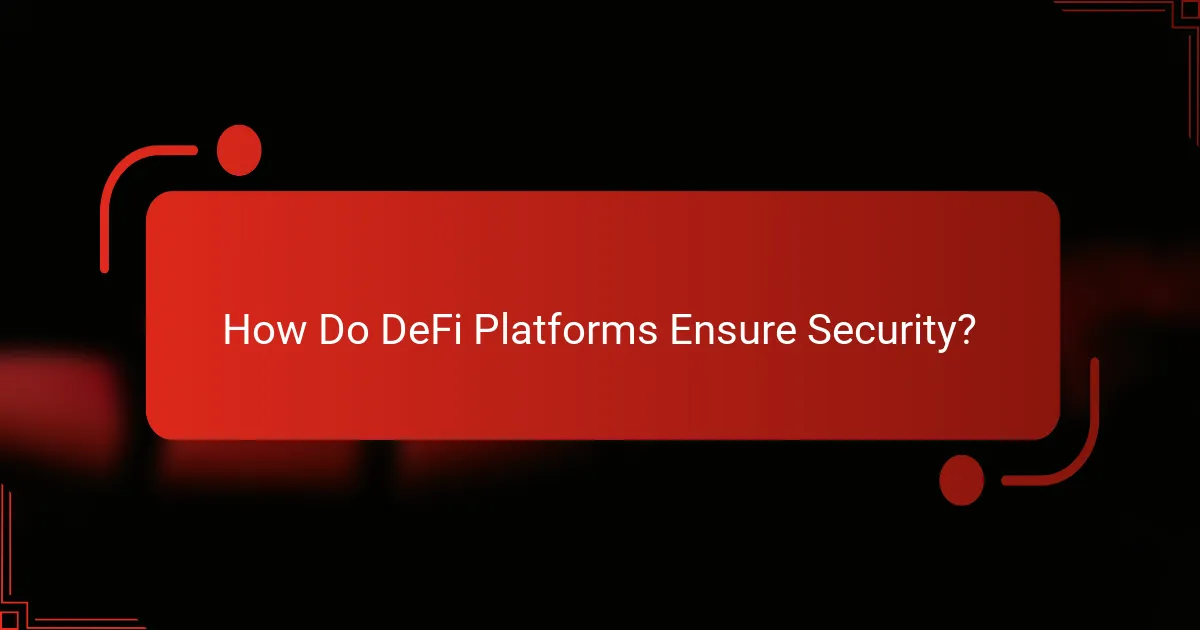
How Do DeFi Platforms Ensure Security?
DeFi platforms prioritize security through various mechanisms designed to protect user assets and maintain trust. Key strategies include smart contract audits, insurance protocols, and decentralized governance, each playing a vital role in minimizing risks.
Smart Contract Audits
Smart contract audits involve thorough reviews of the code that underpins DeFi applications. These audits are conducted by independent security firms to identify vulnerabilities and ensure that the contracts function as intended. Regular audits help maintain user confidence and can prevent significant financial losses.
When choosing a DeFi platform, check if they have undergone recent audits by reputable firms. Look for platforms that publish audit reports, as transparency is crucial for assessing security. Some well-known auditing firms include CertiK, Trail of Bits, and OpenZeppelin.
Insurance Protocols
Insurance protocols provide an additional layer of security by offering coverage against potential losses due to hacks or smart contract failures. Users can purchase insurance policies that compensate them for losses, which can be particularly reassuring in the volatile DeFi landscape.
Popular insurance platforms like Nexus Mutual and Cover Protocol allow users to stake their tokens to provide coverage for others. When selecting a DeFi platform, consider whether it integrates with insurance protocols to mitigate risks associated with smart contract vulnerabilities.
Decentralized Governance
Decentralized governance allows token holders to participate in decision-making processes regarding the platform’s operations and upgrades. This model enhances security by distributing power among a wider group, reducing the risk of centralized control leading to malicious actions.
Platforms that implement decentralized governance often use voting mechanisms where users can propose and vote on changes. Engaging in governance can help users feel more secure, as they have a say in the platform’s future and can address security concerns collaboratively.
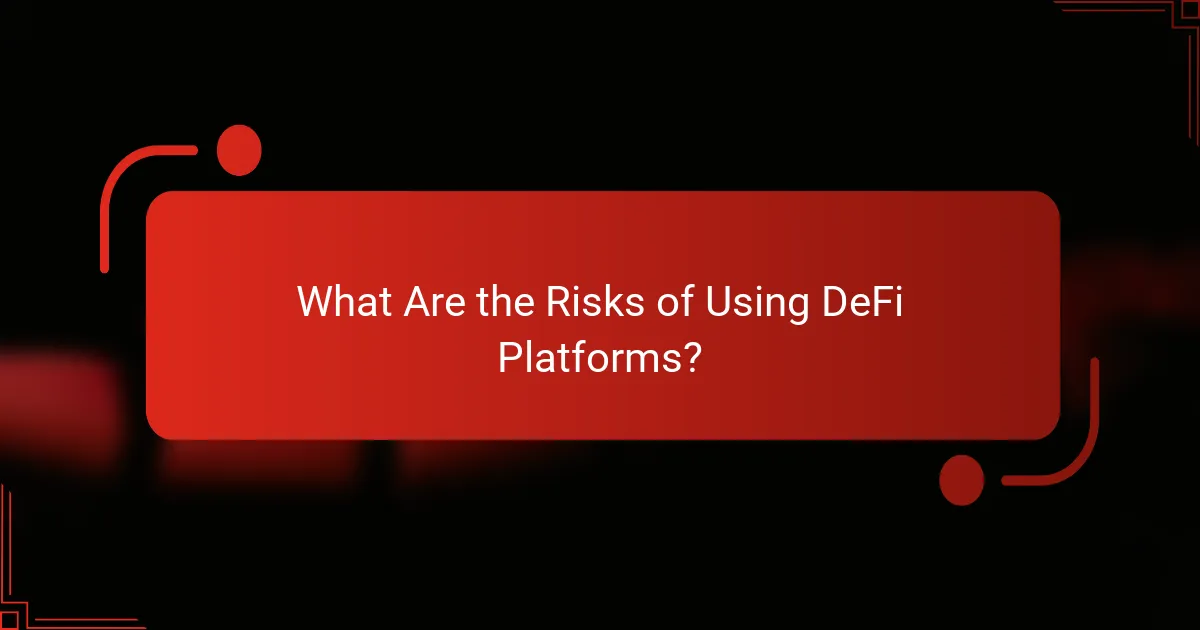
What Are the Risks of Using DeFi Platforms?
Using DeFi platforms carries several risks, including smart contract vulnerabilities, market volatility, and regulatory uncertainties. Understanding these risks is crucial for making informed investment decisions in decentralized finance.
Smart Contract Vulnerabilities
Smart contracts are self-executing contracts with the terms directly written into code. While they automate processes and reduce the need for intermediaries, they can contain bugs or vulnerabilities that hackers may exploit. For instance, high-profile hacks have resulted in significant losses for users due to flaws in the code.
To mitigate these risks, conduct thorough research on the platform’s smart contract audits and security measures. Look for platforms that have undergone independent security assessments and have a history of maintaining robust security practices.
Market Volatility
DeFi platforms often deal with cryptocurrencies, which are known for their price fluctuations. This volatility can lead to rapid gains but also significant losses, making it essential to understand market trends and asset behavior. For example, a sudden market downturn can drastically affect the value of your investments within hours.
To navigate market volatility, consider diversifying your investments across different assets and setting stop-loss orders to limit potential losses. Staying informed about market conditions and trends can also help you make timely decisions.
Regulatory Risks
The regulatory landscape for DeFi is still evolving, and changes in laws can impact how platforms operate. Different countries have varying degrees of acceptance and regulation of DeFi, which can lead to uncertainty for investors. For example, some jurisdictions may impose strict regulations that could limit access to certain platforms or services.
To manage regulatory risks, keep abreast of developments in your country regarding DeFi regulations. Engaging with platforms that prioritize compliance and transparency can also provide an added layer of security for your investments.
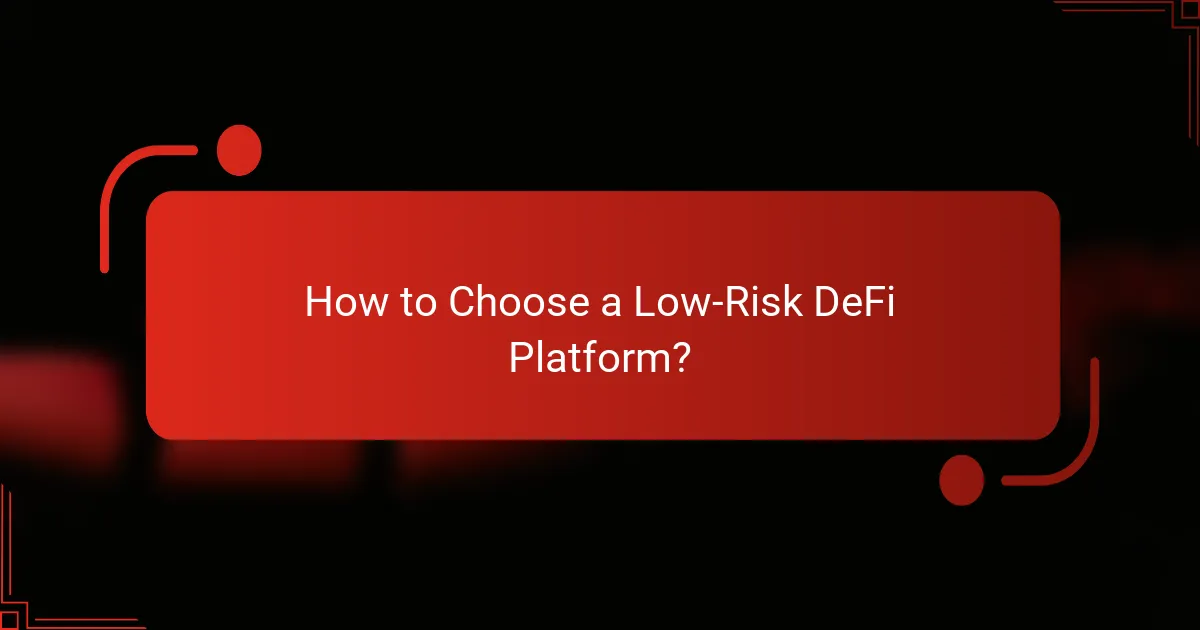
How to Choose a Low-Risk DeFi Platform?
Selecting a low-risk DeFi platform involves evaluating its security features, community reputation, and liquidity options. Prioritizing these factors can help mitigate potential risks associated with decentralized finance investments.
Evaluate Security Features
Security features are crucial when choosing a DeFi platform. Look for platforms that employ robust security protocols, such as multi-signature wallets, regular audits by reputable firms, and insurance coverage against smart contract failures.
Additionally, consider the platform’s history regarding hacks or breaches. A platform with a clean security record and transparent incident response plans is generally more trustworthy.
Check Community Reputation
The community reputation of a DeFi platform can provide insights into its reliability and user experience. Research forums, social media, and review sites to gauge user feedback and overall sentiment.
Platforms with active communities and positive testimonials often indicate a commitment to user satisfaction and ongoing development. Be cautious of platforms with a lack of engagement or numerous complaints.
Assess Liquidity Options
Liquidity options are essential for ensuring that you can easily enter and exit positions without significant price slippage. Check the platform’s trading volume and the availability of liquidity pools to determine how easily you can transact.
Platforms with higher liquidity typically offer better price stability and lower transaction costs. Look for platforms that provide incentives for liquidity providers, as this can enhance overall liquidity and reduce risks associated with sudden market movements.
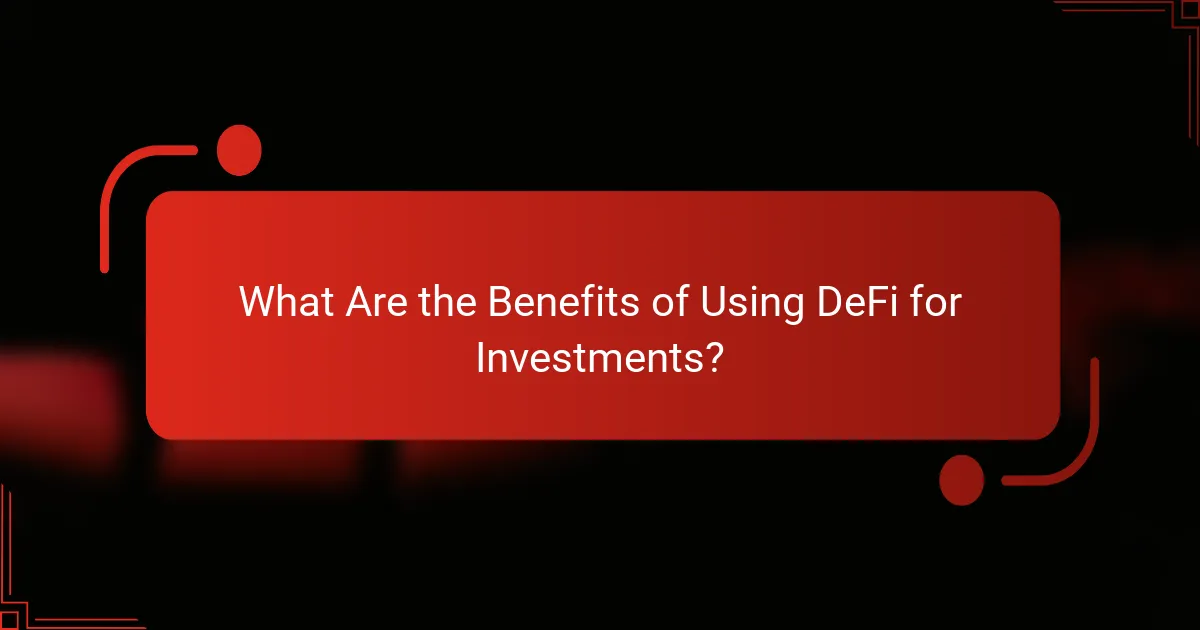
What Are the Benefits of Using DeFi for Investments?
Decentralized Finance (DeFi) offers several advantages for investors, including higher potential returns, greater accessibility, and enhanced transparency. These benefits make DeFi an attractive alternative to traditional financial systems.
Higher Returns Compared to Traditional Finance
DeFi platforms often provide higher returns than traditional financial institutions, primarily due to lower overhead costs and innovative financial products. Users can earn yields on their assets through lending, staking, or liquidity provision, with returns typically ranging from low double digits to even higher percentages, depending on the platform and market conditions.
For example, while a traditional savings account might offer interest rates below 1%, some DeFi protocols can yield returns exceeding 10% annually. However, higher returns often come with increased risks, so investors should carefully assess each opportunity.
Accessibility for Global Users
DeFi platforms are designed to be accessible to anyone with an internet connection, removing barriers often found in traditional finance. Users from various countries can participate without needing a bank account or credit history, making it easier for individuals in underserved regions to access financial services.
This global accessibility allows users to trade, lend, and borrow assets in a decentralized manner, fostering financial inclusion. However, users should be aware of local regulations and potential tax implications related to their DeFi activities.
Transparency in Transactions
One of the key features of DeFi is its transparency, as all transactions are recorded on public blockchains. This allows users to verify the integrity of transactions and the performance of financial products without relying on intermediaries.
While this transparency enhances trust, it is crucial for users to conduct their own research and understand the underlying protocols before investing. Tools and platforms that provide analytics and insights into DeFi projects can help investors make informed decisions.
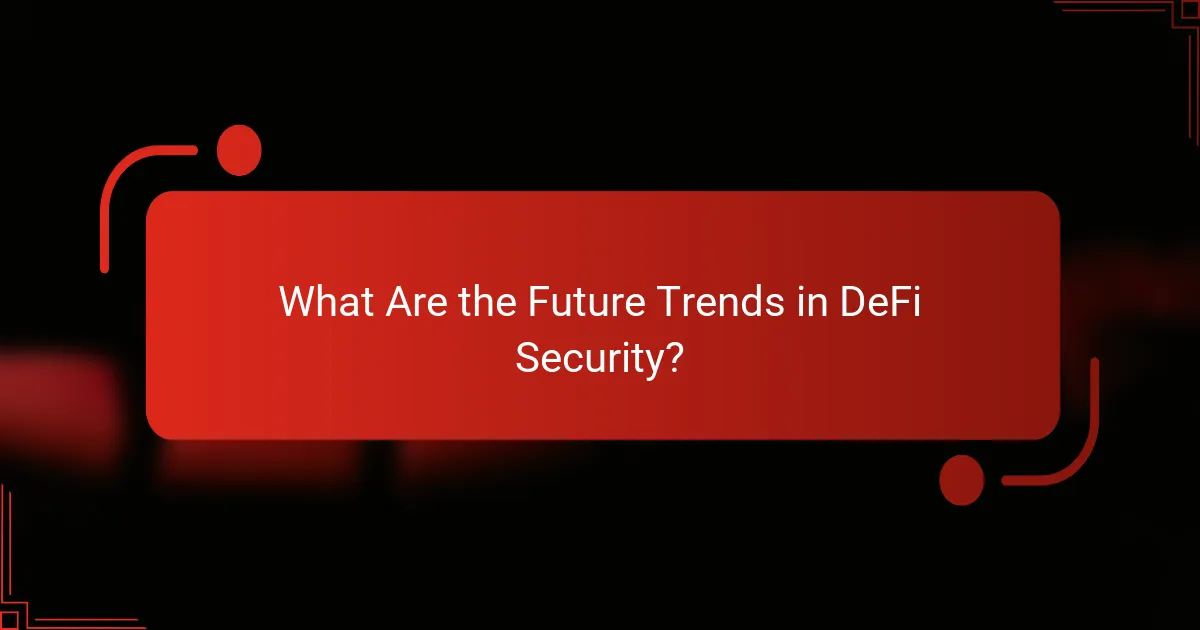
What Are the Future Trends in DeFi Security?
The future of DeFi security is likely to focus on enhanced protocols, regulatory compliance, and advanced risk management strategies. As the DeFi landscape evolves, platforms will increasingly adopt innovative technologies and frameworks to mitigate risks and protect user assets.
Increased Regulatory Oversight
As DeFi platforms gain popularity, regulatory bodies are expected to impose stricter guidelines to ensure user protection and system integrity. This may include requirements for transparency, anti-money laundering (AML) practices, and know your customer (KYC) protocols. Adhering to these regulations can help build trust among users and investors.
Enhanced Security Protocols
Future trends will likely see the implementation of more robust security measures, such as multi-signature wallets and decentralized insurance options. These features can provide additional layers of protection against hacks and exploits. For example, platforms may offer insurance coverage for smart contract failures, which can help mitigate potential losses.
Adoption of Advanced Technologies
Emerging technologies like artificial intelligence and blockchain analytics will play a crucial role in improving DeFi security. AI can help identify unusual patterns and potential threats in real-time, while blockchain analytics can enhance transaction monitoring. Together, these technologies can create a more secure and resilient DeFi ecosystem.
Community-Driven Security Audits
As the DeFi community matures, there will be a greater emphasis on collaborative security audits. Platforms may increasingly rely on community input to identify vulnerabilities and improve their systems. This approach not only enhances security but also fosters a sense of ownership and accountability among users.
